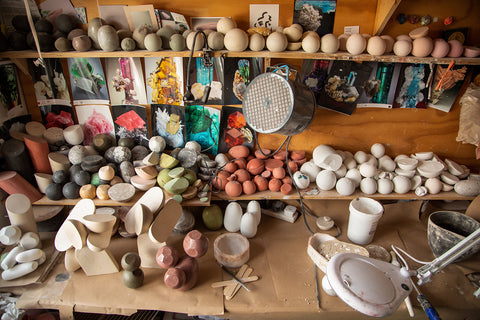VIC WRIGHT

What other artists and sculptors do you admire and why?
I really love the work for Rachel Whitehead, Barbara Hepworth, Eva Hesse and Louise Bourgeois. Subconsciously all my favourite artists and sculptors are women. This is surprising as only 20% of all work shown in major galleries is by women. My mother is also a huge influence on me as at 40 (when I was 14) she went back to college to study, becoming an art lecturer and life drawing teacher.

What inspires your work?
I am influenced in how nature displays beauty in difference. I want to capture the differences between contrasting elements, to create a visual language between materials. My work evokes the natural world, only amplified, distorted and moulded to give new context. I use industrial materials to create delicate tactile results, which is a common thread throughout my work. I love this contradiction.

Tell us about your process.
Typically my work takes the form of casts. Using a base of fine casting cement, different materials such as metal powders and pigments are then added. When drying this results in different textures, colours and surfaces.
Any advice you'd give someone considering becoming a full time artist?
Remember the creative part, making the work is only 50% of the job. Essentially you are running your own business which requires skills such as marketing, accounting, social media and SEO. Often creative businesses start up as a side hustle. I did lots of workshops and online courses to learn the "other" parts of my business, particularly on how to find and sell to my customers.

How do you want other people to feel about your work?
I love feedback. I often work in solitude, so when my work gives people joy and they want it in their homes, I feel incredibly proud. So I guess I want to make people feel happy!

What's next?
I'm always learning and developing my work, so essentially I just want to keep moving forward. I love what I do!
